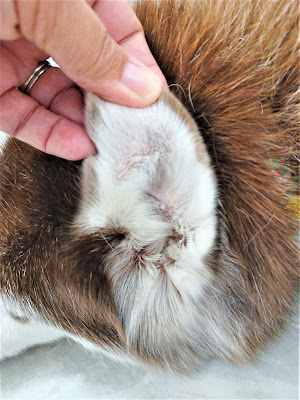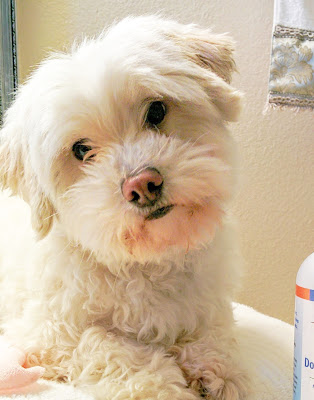Ear infections in dogs are one of the 6 most common health issues for dogs. Signs of dog ear infection are excessive scratching or pawing of the ears, a foul odor coming from your dog's ear, excessive head shaking, bleeding or discharge from the ear, or swelling, redness or scabbing in your dog's ear.
Knowing how to identify, treat, and prevent ear infections in dogs is an important part of routine dog health care.
Ear infections are a very uncomfortable and painful dog health problem. If left untreated, in a worse case scenario it could cause the dog's ear drum to rupture, or the dog could even end up losing his hearing!
Some dog breeds are more prone to developing ear infections than others.
Bassett hounds with their large floppy ears, Cocker Spaniels who tend to have hairy ears, as well as Golden Retrievers, Labrador Retrievers and Labradoodles because of their love of being in the water, can often get ear infections. These are just a few of the dog breeds that are prone to frequent ear infections, but any dog can get ear infections.
My little girl Phoebe had very short legs and larger floppy ears. Her ears always got dirty because they were so close to the ground. She trailed her ears in everything; sand, mud, water, even bunny poo got in her ears! I kept her ears trimmed short and had to clean her ears often, not just because they got so dirty but also to help avoid ear infections.
What are the symptoms of an ear infection in a dog?
🐾 One of the most common signs that your dog may have an ear infection is excessive scratching of the ears or pawing at the ears.
🐾 A foul odor coming from inside your dog's ears is another indication your dog may have an ear infection. Some say it makes their dogs ears smell like Fritos, or Yeast.
🐾 Excessive head shaking may also indicate an ear infection.
🐾 Redness, swelling, scabbing, or any kind of bleeding or discharge coming from your dog's ear could be symptoms of an ear infection.
If you observe any of these symptoms in your dog, contact your Veterinarian right away!
What Causes Ear Infections in Dogs?
Many things could result in your dog getting an ear infection, but here are a few more common causes of ear infections in dogs and puppies.
> Excess moisture, usually from swimming or bathing, in the ears creates an environment that encourages the buildup of yeast and bacteria inside dogs' ears', which can lead to infection.
> Dogs with food or environmental allergies are often prone to ear infections. The dog's body may respond to the allergy with an overgrowth of bacteria or yeast, which can cause infection.
The best way to treat ear infections that are caused by allergies is to determine what is causing the allergy to begin with and eliminate it. It can be a food allergy, seasonal allergies, or allergy to a product being used on the dog such as a medication or fur/skin products. You don't want to get into a futile cycle of constantly treating ear infections caused by allergies and never fully resolving the root cause. It's a waste of time and money, and your poor dog will suffer with a vicious cycle of continual allergies and ear infections.
> If ear mites get into your dogs ears, that can also lead to ear infection. When I volunteered at the animal shelter in Phoenix, dogs brought in by animal control often arrived with their ears infested with ticks and ear mites. It was so awful, I can't even imagine how uncomfortable those dogs must have been! We'd immediately treat them for both ticks and ear mites.
> A foreign object that gets lodged inside a dog's ear can also lead to an ear infection. If it's lodged deep enough inside the ear canal you may not be able to see it. A Veterinarian will need to do a thorough ear exam to locate and remove the foreign body.
> Dogs with very hairy ears, like Cocker Spaniels, can cause the ear canal to get clogged, making it difficult for the dog to expel debris or waxy buildup normally, by shaking their heads to expel wax and debris from their ears.
Treating A Dog Ear Infection
Personally, I believe that some pet care treatment is best left to the professionals rather than attempting to treat the problem yourself. A dog's ear infection, if left without proper treatment, could potentially lead to serious hearing loss or ear damage. I'd rather let the Veterinarian treat my dog's ear infection rather than taking a chance trying to deal with it at home.
If you try a treatment at home and it turns out to be the wrong thing for the type of ear infection your dog has, not only will you be wasting precious time looking for the cause and an effective treatment, you could actually make the infection worse!
It's important to ascertain what is causing the dog's ear infection, what type of infection it is (bacterial, yeast, fungal, foreign object in the ear, etc) and determining what type of treatment is appropriate.
When you bring your dog to the Vet for an assessment of your dog's ear infection, s/he will perform a thorough examination of the ear inside and out. The Vet will fully examine the ear canal and extract any material or debris. Your Vet will then examine what was extracted under a microscope and may also run several tests on the material to narrow down the type and possible cause of your dog's ear infection.
PIN THIS!
Your Veterinarian may prescribe a medicated ointment, eardrops, or other ear cleansing medications. The Vet may also prescribe antibiotic, antifungal, or steroidal medication to treat your dog's ear infection.
If the infection is severe, or has been ignored for too long, surgical options may be needed.
The Vet will determine the proper course of treatment for the type and severity of ear infection in the dog.
How to Prevent ear infections in dogs
Prevention is always the best medicine, and that's definitely true when it comes to preventing dog ear infections. There are a few simple things you can do to reduce the chances of your dog getting ear infections.
The first order of business is to determine if there is an underlying cause of the dog's ear infection, especially if the infection is recurring.
It could be allergies or another medical issue that is causing ear infections. There could even be an object stuck inside your dog's ear canal that isn't visible to the naked eye. Your Veterinarian will do an examination, and run some tests if needed, to find out what is causing the infection in your dog's ears.
Once you've ruled out any underlying issues that may cause an infection in your dog's ears, you can take steps to help prevent your dog from getting ear infections by following these 4 easy dog care steps.
🐾 Most importantly, keep your dog's ears Clean, Clean, CLEAN and Dry. Clean your dogs ears regularly with a dog ear cleaner. Don't use human ear cleansers or other cleaning products, they can be harmful to pets. And never put a Q-tip or other object inside your dogs ear! You can clean the inside flap of her ear with a cotton ball, but never put anything inside the ear canal!
🐾 As soon as your dog comes out of the ocean, pool, lake, creek or other body of water wipe the inside flaps of her ears to get rid of excess moisture.
🐾 Take steps to prevent ear mites. Flea & tick medication can usually prevent them. Be sure to regularly examine your dog's ears for ear mites, especially after being outdoors.
🐾 Like so many other ailments, a healthy diet and exercise can help prevent ear infections, and other dog health issues, by ensuring your dog has a healthy immune system. A weak immune system can make your dog susceptible to ear infections and other ailments.
Under guidance of your Veterinarian you may want to consider adding a probiotic and supplements to your dog's diet to help keep her immune system strong and able to ward off infection. Always consult your Vet before making any changes to your dog's diet.
I add fish oil, a probiotic, and bone broth to my dog's diet. My Veterinarian agreed that all these supplemental ingredients would be beneficial to my particular dogs.
I also give my dog treats that are healthy, with natural ingredients if possible, like salmon treats, fish skins, joint health treats and fresh vegetables and fruit I know she likes. Always consult with your Veterinarian first, before adding any supplements to your dog's diet.
🐾 If your dog has a lot of ear hair, keep the hair inside your dog's ears well groomed. This is best done by an experienced groomer or your Veterinarian. They have the expertise needed to neatly trim dogs' ear hair without nicking the inner ear flap or inadvertently poking the dog's inner ear with a sharp grooming tool.
The skin on a dog's ear flap actually bleeds a lot! An inexperienced groomer once nicked the inside of Phoebe's ear flap and had to use a blood clotting powder to stop the bleeding quickly. That was scary!
I have been extremely lucky, neither of my dogs have ever developed ear infections. My Husky Icy and my Maltese mix Phoebe never liked the water all that much so their ears didn't get soaking wet too often and excess moisture was rarely an issue.
We do a lot of hiking with our dogs though. Going through dense grass and bushes can result in a lot of debris getting into their ears so I've always regularly inspected and cleaned my dogs ears, especially after hikes.
As long as there are no underlying health issues or allergies that cause ear infections, keeping your dog's ears clean and dry definitely helps reduce the odds of dogs getting ear infections.
An infection in a dog's ears can wreak havoc on their health and cause considerable discomfort. It's easy to overlook a dog's ears as being a dog health concern, but being aware of your dog's total health includes paying constant attention to dog ear health.
I hope these tips have been helpful! Sharing is Caring 💖If you enjoyed this post, please share it on your social media!
FOR MORE DOG HEALTH AND SAFETY INFORMATION, SUBSCRIBE TO THE BLOG!
Subscribe
More Pet Health Tips you may find useful:
For more pet health and safety information Subscribe to the blog!







13 comments:
It's great to know neither Phoebe nor Icy had to deal with ear infections. My angel cats Dusty and Precious never dealt with that either. I tried prevention to keep their ears healthy. I would keep their ears clean as I could. For me, I found using a cotton ball with 2 drops of olive oil on it helps get the dirt and wax out really good. Odd but true. Thanks for sharing this informative helpful post!
I clean Layla's ears every night when I get her ready for bed, it is what my vet told me to do after she had an infection last year which with Covid was not easy to get a vet appointment but was fortunate and we dealt with it immediately. Great Info as always
Great post, Cathy. As my Huskies grew older, a few of them would get chronic ear infections. Funny part was Gibson was a wooly, but he never had one. Vet thought possibly allergies since they loved to be outdoors most of the time. Needless to day, I always had ear cleaner and ointment on hand!
I've always been very cautious of ear infections with Henry, since he is part cocker. I do keep the hair in his ears groomed and I clean his ears. This is really good information for dog parents to know about ear infections. Thankfully, Henry's avoid any so far since I've had him. I'm sharing this with my dog friends.
Olive oil is a good idea, Kamira, thanks for sharing that!
I'm glad you're taking such great care of Layla's ears! I'm sorry she had an infection, but it's good you are taking preventative measures.
Oh no, I can't imagine having several Husky's getting ear infections! It is amazing that being a Woolly Gibson never got an ear infection! It could have definitely been allergies, that is one cause of dog ear infection for sure.
I'm so glad Henry hasn't had ear infections, they are quite common in Cockers due to them having an abundance of hair in the ears. Thanks so much for sharing, Terri!
We had a Brittany Spaniel mix who had several ear infections. Luckily, she responded well to treatment and they never got too bad. These are great tips to help prevent ear infections from starting!
It seems that allergies are the number one trigger for ear infection. The inflamed tissues just roll out the red carpet for nasty critters to take hold.
I have never had to deal with an ear infection with my kitties, but I can imagine how difficult it would be! Working with CrittEar, I have heard from tons of dog owners that have dealt with ear infections in their dogs. It is so painful and expensive! These are great tips. You are so right about getting advice from your veterinarian. Trying to fix it yourself could be the source of even bigger problems.
Ear infections are such a common thing here in our house that I don't even blink when it comes to recognizing the signs and moving into the treatment phase. Daviana has environmental allergies and we go through ear infections related to these allergies twice a year, every year - spring and fall. It's to the point that our vet wasn't even asking to see us when I called, he'd just write a prescription for treatment because he knew I was familiar with what was happening.
Prevention and working with a vet to figure out the underlying cause is the best thing we can do. I always feel so bad for pups with chronic ear infections - they seem so painful. Thank you for sharing all your tips!
Post a Comment